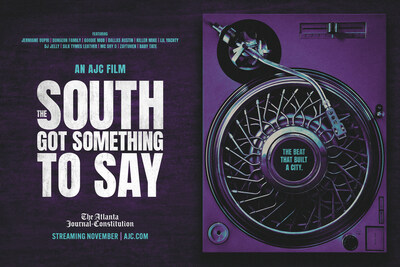“The South Got Something to Say,” are now iconic words uttered by then up-and-coming rapper Andre “Andre 3000” Benjamin of the group Outkast after winning the Best New Rap group award at the 1995 Source Awards. Met with cheers and jeers, one-half of the Outkast duo (made up of Benjamin and Antwon “Big Boi” Patton) set the room and industry on fire by espousing the virtues of being a Southern rapper in an industry dominated by East Coast and West Coast Hip-Hop at the time.
Fast-forward nearly 30 years later and Southern Hip-Hop has blazed a trail and built a dynasty that cannot be denied with the staying power of acts coming out of Atlanta like Outkast, T.I., the Migos, Ludacris, Houston, Memphis, Miami and other Southern cities. Virginia’s Missy “Misdemeanor” Elliott recently became the first woman hip-hop artist to be inducted into the Rock ‘n Roll Hall of Fame. To say that Southern Hip-Hop’s industry dominance is proven is an understatement. As the documentary attests, the South had been saying something since before Outkast exploded on the international scene changing the game and flavor of hip-hop for decades to come.
In honor of the 50th anniversary of hip-hop, Emmy award-winning video journalist and filmmakers Ryon Horne and Tyson Horne (brothers) endeavored to make a documentary exploring the rise of Southern Hip-Hop in tandem with the rise of the city of Atlanta as a major international city. There is no greater example of this evolution than to have Atlanta’s flagship newspaper, The Atlanta Journal-Constitution produce a documentary about the influence of Southern hip-hop, really Atlanta’s influence on hip-hop, and the city that rose up with the rappers from modest beginnings.
AJC‘s Ernie Suggs and DeAsia Paige added producing and writing talents to help buoy a film that took place under the leadership of relatively new editor-in chief Leroy Chapman. Ryon Horne stated, “Getting this film made was a perfect storm of events. We had the right people and talent in place who understood the cultural significance and importance of celebrating the 50th Anniversary of Hip-Hop and the South’s influence on the culture.”
“The conditions were ripe for Atlanta to take this thing built in New York and remake it in its own image,” said AJC Editor-in-Chief Leroy Chapman. “The AJC witnessed this evolution. We were there at the beginning. There have been other films about the 50th anniversary of hip-hop but none that tell it like this. None that bring it home to Atlanta.”
The project marks the launch of AJC Films, part of the storied newspaper’s recently announced effort to transform itself into a modern media company through new voices, content and mediums.
“Atlanta is now one of the country’s largest production hubs for film and television, and the AJC has documented the history of Atlanta, Georgia and the South for the last century and a half,” said AJC President and Publisher Andrew Morse. “We are excited to partner with talented local filmmakers to bring the power of our archives to life for AJC subscribers and fans of great nonfiction content on a variety of platforms.”
The documentary features some of the biggest names in hip-hop, including Jermaine Dupri, Dallas Austin, Killer Mike, Lil Yachty, Zaytoven, Baby Tate and Goodie Mob. The film premiered November 2 at Atlanta’s Center Stage which also featured a day of panels and events discussing the significance of the 50th Anniversary of Hip-Hop and Atlanta’s global influence on Black culture.
“The South Got Something to Say” is available to watch at ajc.com/hiphop. The AJC is in talks with potential partners for wider distribution on streaming platforms and cable networks.
This article was written by Nsenga K. Burton, Ph.D., founder & editor-in-chief of The Burton Wire. Follow Nsenga on social media @Ntellectual.
Follow the Burton Wire @TheBurtonWireNews or @TheBurtonWire on IG.




